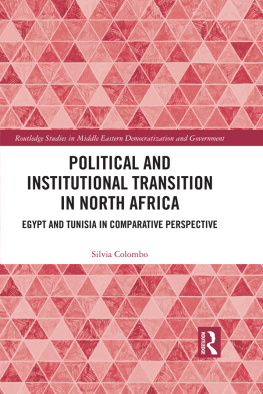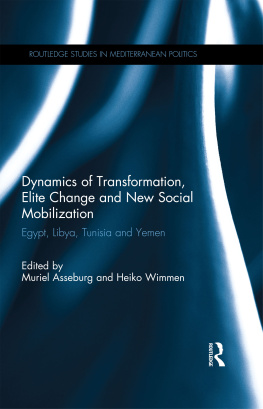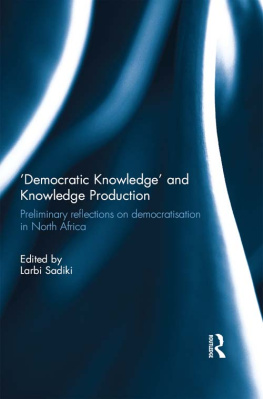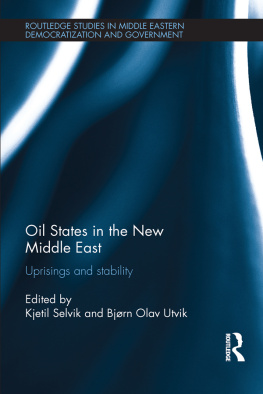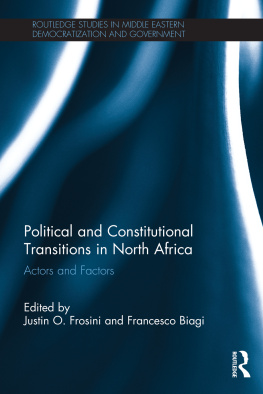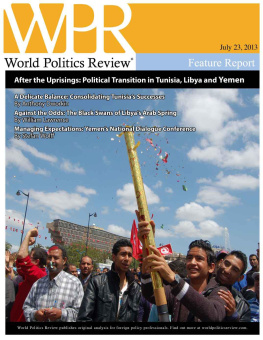Political and Institutional Transition in North Africa
The year 2011 will go down in history as a turning point for the Arab world. The popular unrest that swept across the region and led to the toppling of the Ben Ali, Mubarak, and Qaddhafi regimes in Tunisia, Egypt, and Libya has fundamentally altered the social, economic, and political outlooks of these countries and the region as a whole.
This book assesses the transition processes unleashed by the uprisings that took place in Egypt and Tunisia in 2011. The wave of unrest and popular mobilisation that swept through these countries is treated as the point of departure of long and complex processes of change, manipulation, restructuring, and entrenchment of the institutional structures and logics that defined politics. The book explores the constitutive elements of institutional development, namely processes of constitution making, electoral politics, the changing status and power of the judiciary, and the interplay between the civilian and the military apparatuses in Egypt and Tunisia. It also considers the extent to which these two countries have become more democratic, as a result of their institutions being more legitimate, accountable, and responsive, at the beginning of 2014 and from a comparative perspective. The impact of temporal factors in shaping transition paths is highlighted throughout the book.
The book provides a comprehensive assessment of political and institutional transition processes in two key countries in North Africa and its conclusions shed light on similar processes that have taken place throughout the region since 2011. It will be a valuable resource for anyone studying Middle Eastern and North African politics, area studies, comparative institutional development and democratisation.
Silvia Colombo is Head of the Mediterranean and Middle East Programme at the International Affairs Institute (IAI) in Rome. She works on Euro-Mediterranean cooperation and domestic and regional politics in the Arab world.
Routledge Studies in Middle Eastern Democratization and Government
Edited by Larbi Sadiki
Qatar University
This series examines new ways of understanding democratization and government in the Middle East. The varied and uneven processes of change occurring in the Middle Eastern region can no longer be read and interpreted solely through the prism of Euro-American transitology. Seeking to frame critical parameters in light of these new horizons, this series instigates reinterpretations of democracy and propagates formerly subaltern narratives of democratization. Reinvigorating discussion on how Arab and Middle Eastern peoples and societies seek good government, Routledge Studies in Middle Eastern Democratization and Government provides tests and contests of old and new assumptions.
EU Foreign Policy and Hamas
Inconsistencies and paradoxes
Adeeb Ziadeh
Politics and Revolution in Egypt
Rise and fall of the youth activists
Sarah Anne Rennick
Kurdistan in Iraq
The evolution of a quasi-state
Aram Rafaat
Political and Institutional Transition in North Africa
Egypt and Tunisia in comparative perspective
Silvia Colombo
Clientelism and Patronage in the Middle East and North Africa
Networks of dependency
Edited by Laura Ruiz de Elvira, Christoph H. Schwarz and Irene Weipert-Fenner
For more information about this series, please visit: www.routledge.com/middleeaststudies/series/RSMEDG
First published 2018
by Routledge
2 Park Square, Milton Park, Abingdon, Oxon OX14 4RN
and by Routledge
711 Third Avenue, New York, NY 10017
Routledge is an imprint of the Taylor & Francis Group, an informa business
2018 Silvia Colombo
The right of Silvia Colombo to be identified as author of this work has been asserted by her in accordance with sections 77 and 78 of the Copyright, Designs and Patents Act 1988.
All rights reserved. No part of this book may be reprinted or reproduced or utilised in any form or by any electronic, mechanical, or other means, now known or hereafter invented, including photocopying and recording, or in any information storage or retrieval system, without permission in writing from the publishers.
Trademark notice: Product or corporate names may be trademarks or registered trademarks, and are used only for identification and explanation without intent to infringe.
British Library Cataloguing-in-Publication Data
A catalogue record for this book is available from the British Library
Library of Congress Cataloging-in-Publication Data
A catalog record has been requested for this book
ISBN: 978-0-8153-4709-5 (hbk)
ISBN: 978-1-351-16980-6 (ebk)
Typeset in Times New Roman
by Apex CoVantage, LLC
Looking back over the past seven years, I am astonished to see what great changes have taken place in my life while drafting and re-drafting this book, which has been a constant feature of it. Sometimes lifes circumstances have led me to neglect it, at other times enthusiasm and research creativity have made me progress beyond my own expectations. But I have never been alone in this endeavour. Lots of people have contributed to it from the substantive, intellectual, organisational, and, most importantly, emotional points of view. Some of them do not know how much they have been part of this journey. But I would like to take a moment to name and thank them all. Needless to say, all mistakes remain my sole responsibility.
I owe a big thanks to a group of people who have been a daily presence in my life in the past seven years and who have made my days busier but at the same time more stimulating and rewarding. All the members of the big IAI family and Professor Leonardo Morlino have contributed to this book in many different ways, not least by pushing me to start this journey and by constantly providing me with a friendly and inspiring environment to discuss research and work problems. A great number of friends have shared with me the burdens, joys, frustrations, and achievements that are a part of any process of intellectual and personal growth. Some of them are the colleagues who at different moments, in various places, and in a variety of forms have provided me with their invaluable support and advice, have enlightened me with their remarks, have listened to my doubts, and have laughed with me. Similarly, my friends at home also deserve a special thank you for two very important reasons. First, because their friendship has made me what I am and, second, because their presence near or far their words, and their whole lives have taught me a very important thing, namely that drafting a book is not an isolated chapter in ones life. They might not know much about what is written here but I have greatly benefited from their friendship.
This research endeavour has also given me the possibility of travelling and spending some time abroad. Most of the empirical research for the book was conducted in the field in Egypt and Tunisia. Not only have these research trips been instrumental for collecting first-hand evidence and information, but they have also provided me with the opportunity to experience with my own senses the things I have talked about in this book, thus sharpening my understanding of the transition processes in these countries. I would like to thank here, in particular, all the people who agreed to be interviewed. Without their help, this book would never have seen the light. For anonymity purposes I cannot mention them, but they know who they are.

